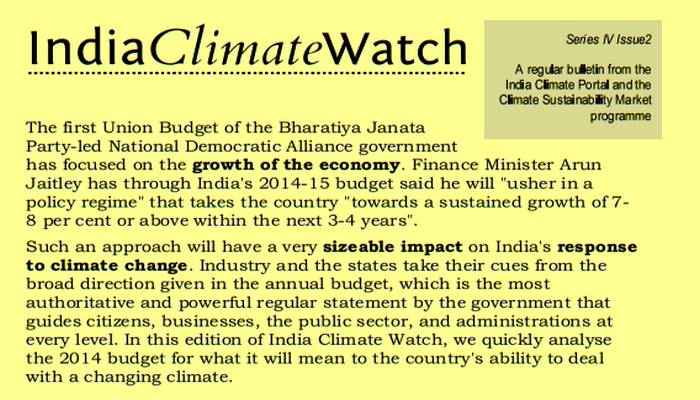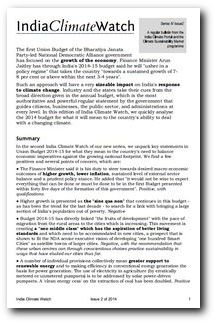 The first Union Budget of the Bharatiya Janata Party-led National Democratic Alliance government has focused on the growth of the economy. Finance Minister Arun Jaitley has through India’s 2014-15 budget said he will “usher in a policy regime” that takes the country “towards a sustained growth of 7-8 per cent or above within the next 3-4 years”.
The first Union Budget of the Bharatiya Janata Party-led National Democratic Alliance government has focused on the growth of the economy. Finance Minister Arun Jaitley has through India’s 2014-15 budget said he will “usher in a policy regime” that takes the country “towards a sustained growth of 7-8 per cent or above within the next 3-4 years”.
Such an approach will have a very sizeable impact on India’s response to climate change. Industry and the states take their cues from the broad direction given in the annual budget, which is the most authoritative and powerful regular statement by the government that guides citizens, businesses, the public sector, and administrations at every level. In this edition of India Climate Watch, we quickly analyse the 2014 budget for what it will mean to the country’s ability to deal with a changing climate.
 In the second India Climate Watch of our new series, we unpack key statements in Union Budget 2014-15 for what they mean to the country’s need to balance economic imperatives against the growing national footprint. We find a few positives and several points of concern, which are:
In the second India Climate Watch of our new series, we unpack key statements in Union Budget 2014-15 for what they mean to the country’s need to balance economic imperatives against the growing national footprint. We find a few positives and several points of concern, which are:
- The Finance Minister said it is his duty to steer towards desired macro-economic outcomes of higher growth, lower inflation, sustained level of external sector balance and a prudent policy stance. He added that “it would not be wise to expect everything that can be done or must be done to be in the first Budget presented within forty five days of the formation of this government”. Positive, with qualifications
- Higher growth is presented as the “sine qua non” that continues in this budget -as has been the trend for the last decade – to search for a link with bringing a large section of India’s population out of poverty. Negative
- A number of individual provisions collectively mean greater support to renewable energy and to making efficiency in conventional energy generation the basis for power generation. The use of electricity in agriculture (by erratically metered or unmetered pumpsets) is to be addressed by solar power-driven pumpsets. A ‘clean energy cess’ on the extraction of coal has been doubled. Positive
The relationship between the central government and states is a factor that influences budgetary support for dealing with the effects of climate change. Read why in the India Climate Watch bulletin 2014 02 (pdf, 187kb).
Leave a Reply